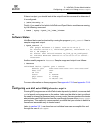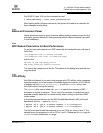
2 – InfiniPath Cluster Administration
Performance and Management Tips
IB6054601-00 D 2-19
Q
For SUSE 9.3 and 10.0 run this command as root:
# /sbin/chkconfig --level 12345 powersaved off
After running either of these commands, the system will need to be rebooted for
these changes to take effect.
2.10.3
Balanced Processor Power
Higher processor speed is good. However, adding more processors is good only if
processor speed is balanced. Adding processors with different speeds can result
in load imbalance.
2.10.4
SDP Module Parameters for Best Performance
To get the best performance from SDP, especially for bandwidth tests, edit one of
these files:
/etc/modprobe.conf (on Fedora and RHEL)
/etc/modprobe.conf.local (on SUSE and SLES)
Add the line:
options ib_sdp sdp_debug_level=4
sdp_zcopy_thrsh_src_default=10000000
This should be a single line in the file. This sets both the debug level and the zero
copy threshold.
2.10.5
CPU Affinity
InfiniPath will attempt to run each node program with CPU affinity set to a separate
logical processor, up to the number of available logical processors. If CPU affinity
is already set (with
sched_setaffinity(), or with the taskset utility), then
InfiniPath will not change the setting.
The
taskset utility can be used with mpirun to specify the mapping of MPI
processes to logical processors. This is useful, for example, to make best use of
available memory bandwidth or cache locality when running on dual-core SMP
cluster nodes.
In the following example we use the NAS Parallel Benchmark’s MG (multi-grid)
benchmark and the
-c option to taskset.
$ mpirun -np 4 -ppn 2 -m $hosts taskset -c 0,2 bin/mg.B.4
$ mpirun -np 4 -ppn 2 -m $hosts taskset -c 1,3 bin/mg.B.4
The first command forces the programs to run on CPUs (or cores) 0 and 2. The
second forces the programs to run on CPUs 1 and 3. Please see the
man page for
taskset for more information on usage.


















